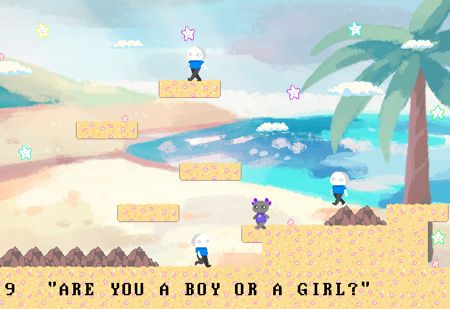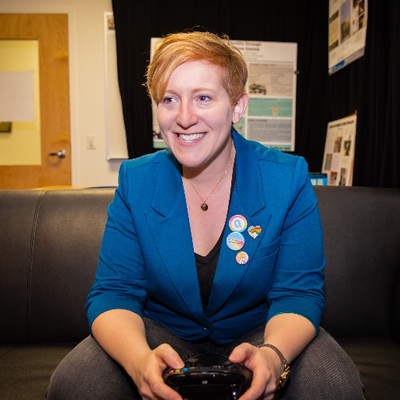My co-organizers and I are very proud of the wonderful students who took part in the pilot program of the Queerness and Games Design Workshop here at Berkeley in September and October. Our hope was to put accessible game-making tools into the hands of a diverse group of students, and to bring the work of QGCon to the amazing undergrads on campus. The games that the workshop participants made blew us away. They tackled everyday issues faced by queer students in insightful and exciting ways.
The games from the design workshop are now available to play (for free)! Check them out:
– Ultimate Star Collector: Winner of the Universe. It’s a platformer built in Melon JS that features a protagonist of non-binary gender and some gorgeous retro-meets-watercolor art. As players progress in search of stars, levels become harder and NPCs become more confrontational. Can you make it from childhood to early adulthood while facing increasing levels of misunderstanding and discrimination?
– Hard Mode 101. It’s an RPG built in Unity that re-imagines the daily obstacles of college as a series of turn-by-turn battles. Fight that 9:00 a.m. class with compulsive note-taking. Go to a club meeting and combat problematic language with the power of rainbows. Deal damage at a party by dressing fierce and smashing gender binaries.
– That One Time You Left Everything That You Needed at Home. It’s a text-based game built in Twine that walks players through the hectic life of a campus commuter. Wake up. Face an empty fridge. Dress fast and fabulous. Rush to class. Face impending gender misidentification. Celebrate when your professor cancels lecture (editors note: sad face).
– The Becoming. It’s a point-and-click adventure built in GameMaker. Players start as seemingly genderless and unmarked figures. As they progress through various landscapes, they take on new attributes and clothes. The message: identity and self-presentation aren’t just about how you were born, they’re about your life experiences and who you become. For more, see co-creator Jenn Georgevich’s great write-up of the game and the creative process.
– The Convenience Store Contingency. It’s a JRPG that started in GameMaker but hopped over to Unity. Oh no, you’re out of delicious snacks! In order to make your way to the convenience store, you have to rock-paper-scissors your way past combative acquaintances, frustrating ex-partners, and nosy parents ready to doll out heteronormative prescriptions. Why haven’t you settled down with a nice boy yet?


